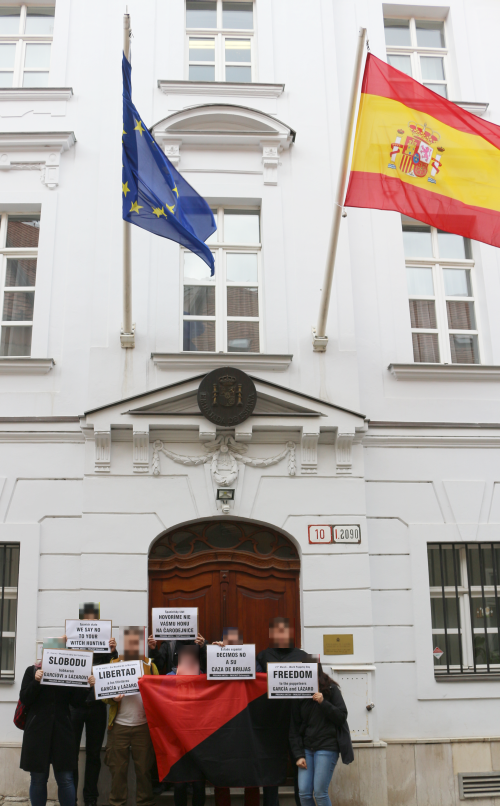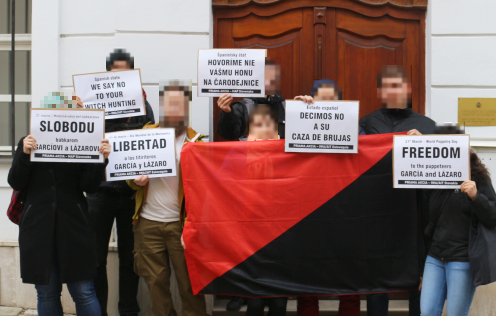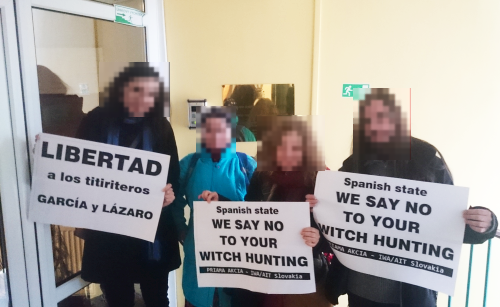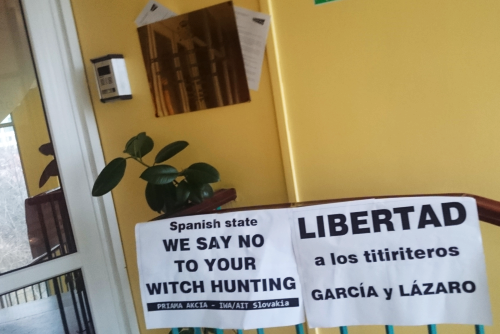World Puppetry Day in the shadow of repressions
22/03/2016
Priama akcia decided to take a stand towards the restriction of the freedom of speech of puppeteers during the World Puppetry Day (21st March). In solidarity with the puppeteers from Títeres Desde Abajo, who face up to seven years in prison for the absurd charges of terrorism for their play Witch and Don Cristóbal, we organized a protest visit to the Spanish embassy in Bratislava, and activists in Košice visited the Spanish consulate. On the same day, we also published an extensive article on the recent attacks against artists in Slovakia and Spain, and also prepared an interview with a Priama akcia member, who is an amateur puppeteer.
Protest visit at the Spanish embassy in Bratislava
The visit was quite strange. First, we informed the person at the reception desk about the reasons of the protest and asked for a meeting with the ambassador Félix Valdés. We were told to sit in the waiting room and wait. After a while, another worker from the embassy appeared and we repeated the same thing. Afterwards he left to get the ambassador, but after some ten minutes of waiting yet another Slovak worker appeared (from the cultural department). The ambassador was allegedly extremely busy. So we explained the reasons of the protest to her as well and handed her a protest letter (PDF).
Michal Tulík from Priama akcia union commented on the situation at the embassy: “We think it is cowardly of the official representative of the Spanish Kingdom not to come and take the protest letter in person. First he left people waiting and them he sent a worker of the embassy, although he knew that the protest was related to actions of the Spanish state, which he represents. We are curious about how he will react when we visit in the future.”
We would like to thank everyone who supported the action, although it was called without any promoting, in a very short time frame and took place during the working day.


Protest in front of the Spanish consulate in Košice
The appeal of Priama akcia to show solidarity with the puppeteers was taken up by activists in Košice, who paid a visit to the honorary consulate of the Spanish Kingdom. They wanted to hand over a protest letter and express their outrage regarding the steps of the Spanish authorities, but the consulate was closed.
“For me, such an expression of solidarity, though small, is very important. We would like to react to several things: we are concerned about freedom of speech, freedom of expression in art and generally in any political context in public in Slovakia, in Spain and anywhere else,” said Marián Horváth.


Interview with Daniel Drevený, member of Priama akcia and amateur puppeteer
- You started with puppeteering a short time ago. What inspired you?
I have been an amateur puppeteer for approximately one year now. It was a lucky chance, because my acquaintance has a small puppet theatre that he decided to dust off. He took it out of the basement, and when we played with it at his house, it got me. I liked that I could entertain kids and work with my voice. I missed both these things a lot because five years ago, I left school where I worked as a teacher and started working in a company. I loved teaching, but I had to quit because of a low wage. It is a big difference to sit at the computer all day and sometimes say two sentences in eight hours. It is a difference to the dynamic and creative work of a teacher. When an opportunity arose to be part of a puppet theatre in my free time, I didn’t hesitate.
- Many people think that puppet theatre is only for children.
I used to share that view, but I learned quickly that there is for example Dezorzovo lútkové divadlo, which plays shows for adults. After all, we also managed to make a show primarily for adults, which also contained political statements and expressive language. Children believe that the puppets really come to life during the show and I think that adults enjoy when the puppeteer finds the right voice for the character and uses humour.
- What do you think about the attacks on the freedom of artistic expression in Slovakia and Spain?
When I read the story about my Spanish colleagues, I felt sorry but it also made me quite angry. State authorities are sometimes extremely inventive and exercise pressure on artists using various made-up reasons.
The same is happening in Slovakia. Kotleba’s recent attacks (note: leader of the extreme-right party ĽSNS who was elected head of the Banská Bystrica Self-Governing Region in November 2013; in July 2015 he stopped state donations for an artistic dance theatre, in September 2015 state donations for a puppet theatre and in March 2016 he forced an amateur theatre to end their performance in the middle of the play; his party got 8 percent of votes in March 2016 parliamentary elections) remind me of a period when I lived in Trnava. There were problems with neo-Nazis and racist thugs from the ranks of Spartak Trnava football team. These people caused trouble in the streets, at concerts, in the neighbourhoods, at the railway station or during city fairs, basically everywhere where they had an opportunity to hit or at least threaten someone in bigger numbers. They called us junkies, hated our colourful clothes and extravagant hairstyles... They always found some stupid pretexts. Sometimes we were afraid to go out or to clubs alone. The only thing that helped was that we started to come together and take initiative. We learned who these problematic people were – what they do, where they go, what position they have in their groups – but we also started to get active in different social problems. Thanks to that we were able to realize our abilities and strengths and stopped being afraid. The important thing is that we started to build a culture around us which showed that we care about things. We tried to change the environment around us, cared about urban green areas or homelessness. Later the Nazis in Trnava stopped being openly violent and, simply put, formed Pospolitosť etc. (note: Slovenská pospolitosť is an extreme-right NGO whose leader in the past was Kotleba; they are even more extreme than Kotleba’s party). Today Kotleba and his party are generally known.
A few days ago I read an interview with the director of Divadlo Štúdio tanca in Banská Bystrica (note: the theatre that was forced to cancel a festival because Kotleba stopped finances which were already reserved for this purpose by the state). She mentioned that Kotleba or the head of the Self-Governing Region office publicly claimed that they should stop doing drugs. It’s the same messages that we heard from the Nazis in the past. The difference is that now this person has a mandate from a part of the society and is trying to harm reputable artist ensembles. Everyone realizes that it is absurd. Some can defend rather well (bullied artists that did not receive the donations meet regularly to solve problems and political pressures) and some not so well (artists from Brezno were shocked and did not finish the play), but I think that the best answer is that which gives self-confidence and creative freedom to the artists and people who like art.
Yes, Kotleba is stopping donations and ending theatre performances, which makes him a superb theme for a parody, but I think that there is a much wider field open to artists. Many politicians (regardless of whether they are called fascists or extremists) have a tendency to scare people with immigrants or Roma population… I think that there is a lot of themes as well as people who would come to see such a performance and instead of being falsely shocked by swear words, would enjoy it and have a nice colourful day (laugh).
Solidarity workers’ union Priama akcia
Slovak section of the International Workers’ Association (IWA-AIT)